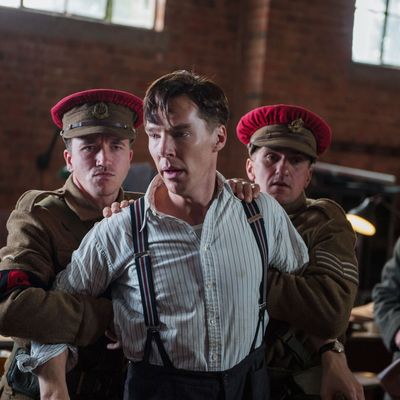
The Imitation Game is a highly simplified version of the highly complex life of proto-computer genius, World War II code breaker, and gay martyr Alan Turing — but even with all its elisions and distortions it tells a cracking good story. Turing is played with captivating strangeness by Benedict Cumberbatch, who has the perfect visage for a man who seems to have been part alien (at the very least on the outer reaches of Aspergerian); Cumberbatch’s hemisphere-wide blue eyes look as if they’re taking in what the rest of us will never even glimpse. The role is shaped — no surprise — to make Turing Sherlockian in his arrogance, insisting with no visible proof that his machine (which he calls “Christopher”) will, when completed, make fast work of the dauntingly complex “Enigma” code that enables the Nazis to execute fearsome maneuvers on land and (especially) sea. But Turing isn’t so much an ass as a man oblivious to social cues and, on the rare occasions when his emotions are engaged, with few defenses. As a mathematician, he’s comfortable in abstract space. As a human, he’s … comfortable in abstract space.
Cumberbatch is the one freaky touch in an otherwise conventional movie, but the conventions in this case work handsomely. Shooting from a tidy script by Graham Moore, Norwegian director Morten Tyldum (he made the witty Jo Nesbø noir Headhunters) jumps among three plotlines, one of mounting excitement, one mounting dread, one mounting pathos. The central strand is the British attempt at Bletchley to break Enigma and stop the German war machine. But that plot is a flashback, viewed from the early-’50s vantage of a man exposed as a “sodomite” at a time when the punishment was either prison or chemical castration. The third strand is a flashback within a flashback: Turing as a youth, smitten with a classmate who gives him a book on codes and ciphers. The boy’s name is Christopher.
You’ll get an F if your only source for a paper on Turing is The Imitation Game; it telescopes like mad. The Bletchley scenes are rigged to show how Turing alienates his colleagues, who slowly recognize his brilliance and stand up for him against the domineering Commander Denniston (Charles Dance). The film is true, though, to the extraordinary friendship between Turing and Joan Clarke (Keira Knightley), a rare female colleague and one he almost married. It’s intriguing, their meeting of minds on both Enigma and the possibility of a nonsexual union between two unique individuals in a firmly sexist, homophobic culture. (Knightley’s fanged grin as she tells Turing his homosexuality needn’t be an issue is very appealing.) The final bit between Alan and Joan is pure Hollywood, though. The filmmakers needed someone to tell the broken Turing — whose achievements, like those of his colleagues, would not be revealed for decades — how he saved the civilized world. The tragedy is that no one in his life probably ever did.
Big studios used to turn out a lot of middlebrow Oscar-bait biopics like The Imitation Game, but in these days of “franchise”-oriented moviemaking, it falls to so-called indie executives like Harvey Weinstein to fill the gap. Bless him for that. Even with his heavy scissors and impulse to schmaltzify, he makes solid “issue” pictures that studio heads of old would respect — if they could get past their raging homophobia, anyway.
*This article appears in the November 17, 2014 issue of New York Magazine.


